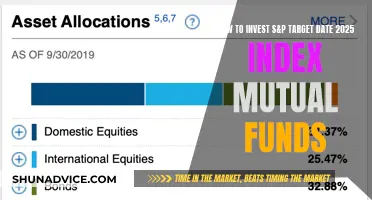
Equity funds are a type of investment fund that pools money from investors to buy a portfolio of stocks. They are also known as stock funds because of their focus on stocks.
Equity funds are professionally managed and aim to generate returns for investors. They are a popular investment vehicle as they offer a diversified, low-risk approach to investing in stocks, with the potential for attractive long-term returns.
| Characteristics | Values |
|---|---|
| Type of investment | Stocks/equity |
| Investment vehicle | Mutual fund |
| Investment style | Actively managed or passively managed |
| Investment approach | Aggressive growth, income-oriented, value, growth |
| Investment focus | Domestic or international stocks |
| Investment universe | Large-cap, mid-cap, small-cap |
| Number of stocks in portfolio | 40-50 |
| Investment time horizon | Long-term (more than 5 years) |
| Investment risk | High risk in the short-term |
| Investment return | Capital gains, dividends |
What You'll Learn

Actively managed funds vs. passively managed funds
Equity funds are a type of investment fund that pools money from investors to trade primarily in a portfolio of stocks, also known as equity securities. They are often categorised as either actively or passively managed.
Actively managed funds take a hands-on approach, with a fund manager deciding how and where to invest the funds. The goal is to beat the market, and fund managers employ various strategies to take advantage of short-term price fluctuations. Actively managed funds tend to have higher fees and are less tax-efficient.
Passively managed funds, on the other hand, are more hands-off and typically follow a market index such as the S&P 500. The goal of a passive fund is to match the market (before fees are taken into account). Passive funds tend to have lower fees and are more tax-efficient, but they rarely beat the market.
The choice between active and passive funds depends on your goals, risk tolerance, and investment philosophy. Active funds may be preferable for those seeking the potential for outperformance, while passive funds offer lower costs and market-matching returns. Some funds offer a blend of the two approaches to balance risk and potential returns.
Historically, passive funds have tended to outperform active funds after accounting for fees, transaction costs, and taxes. However, active funds have shown higher long-term success rates in certain categories, including real estate, bond, and small-cap equity funds.
Sequoia Venture Fund: How to Invest and Gain Access
You may want to see also

Large-cap funds
Blue-chip companies are leaders in their respective industries, with strong reputations, quality, and reliability. Their stocks are easily traded even during challenging economic times, making blue-chip funds highly liquid investments. The frequent sale and purchase of these stocks ensure easy cash flow and stable returns.
When investing in large-cap funds, it is important to consider the applicable charges, such as management fees, and understand the taxation of short-term and long-term capital gains.
Understanding Federal Funds Rates, Dividends, and CODs
You may want to see also

Mid-cap funds
When investing in mid-cap funds, it's important to have a long-term investment goal in mind, as they can be more affected by economic downturns and may take longer to recover. Additionally, not all mid-cap companies will grow into large-cap companies, and there is a risk of bankruptcy in tough markets. Mid-cap funds also tend to have higher expense ratios, which can eat into returns.
Some examples of top-performing mid-cap funds include the BlackRock MidCap Growth Equity Fund and the Vanguard Mid-Cap ETF.
Money Market Index Funds: A Smart Investment Strategy
You may want to see also

Small-cap funds
When deciding whether to invest in small-cap funds, it is important to consider the following:
- The potential for higher returns compared to mid-cap or large-cap funds due to the strong growth potential of small-cap companies.
- The lower Net Asset Value (NAV) of small-cap funds means you can buy more units, boosting your returns if market conditions are favourable.
- The opportunity to diversify your financial portfolio and reduce your overall investment risk.
- The high level of risk involved with small-cap funds due to their sensitivity to market movements and potential for substantial losses if the market slumps.
- The recommended investment timeframe of eight to ten years to allow your investment to generate returns and manage the impact of volatility.
Mutual Fund Investments: Reporting 1099-INT Details
You may want to see also

Growth funds vs. value funds
Equity funds are a type of investment fund that pools money from investors to trade in a portfolio of stocks. They are also known as stock funds. Equity funds can be categorised in several ways, including investment style, portfolio focus, and level of diversification.
Two primary categories of equity funds are growth funds and value funds.
Growth Funds
Growth funds invest in stocks of companies expected to have more rapid earnings growth, often characterised by higher price-to-earnings (P/E) ratios. These companies typically reinvest their earnings into expanding their businesses rather than paying dividends. Growth fund managers try to identify companies with new products, services, or business models that have the potential to disrupt their industries and capture significant market share. Growth stocks can be more volatile and are therefore considered riskier investments. They are suited to investors with a longer time horizon who can weather short-term market changes.
Value Funds
Value funds, on the other hand, buy stocks that are considered undervalued based on fundamental analysis and often have lower P/E ratios, higher dividends, and lower price-to-book ratios. Value investors seek to buy shares in companies trading at a discount to their intrinsic value, often due to temporary setbacks or market inefficiencies. These companies may be in mature industries with slower growth prospects but offer the potential for steady returns and income. Value stocks have more limited upside potential and are therefore considered safer investments than growth stocks.
Growth vs Value
The choice between growth and value funds depends on an investor's goals, risk tolerance, and investment philosophy. Growth funds offer the potential for higher returns but carry more risk, while value funds emphasise steady returns and income with lower risk. Some funds offer a blend of both growth and value stocks to balance risk and potential returns.
Sector Funds: To Invest or Not?
You may want to see also
Frequently asked questions
Equity funds are a type of investment fund that pools money from investors to buy a portfolio of stocks. They are also known as stock funds.
Equity funds offer investors a professionally managed, diversified approach to investing in stocks, with the potential for attractive long-term returns. While investing in stocks carries more risk than some other investments, equity funds can diversify with stocks from many different companies, thus offering some protection from the risk of one or more of the stocks underperforming.
Equity funds can make money in two ways: by buying shares of a company at a lower price and selling them at a higher price, and through dividends distributed by the companies they invest in.
The main risk with equity funds is market risk, which is the possibility that economic downturns, geopolitical events, or changes in investor sentiment could cause stock prices to decline. During market turbulence, equity fund prices can fluctuate significantly, potentially leading to short-term losses for investors.







